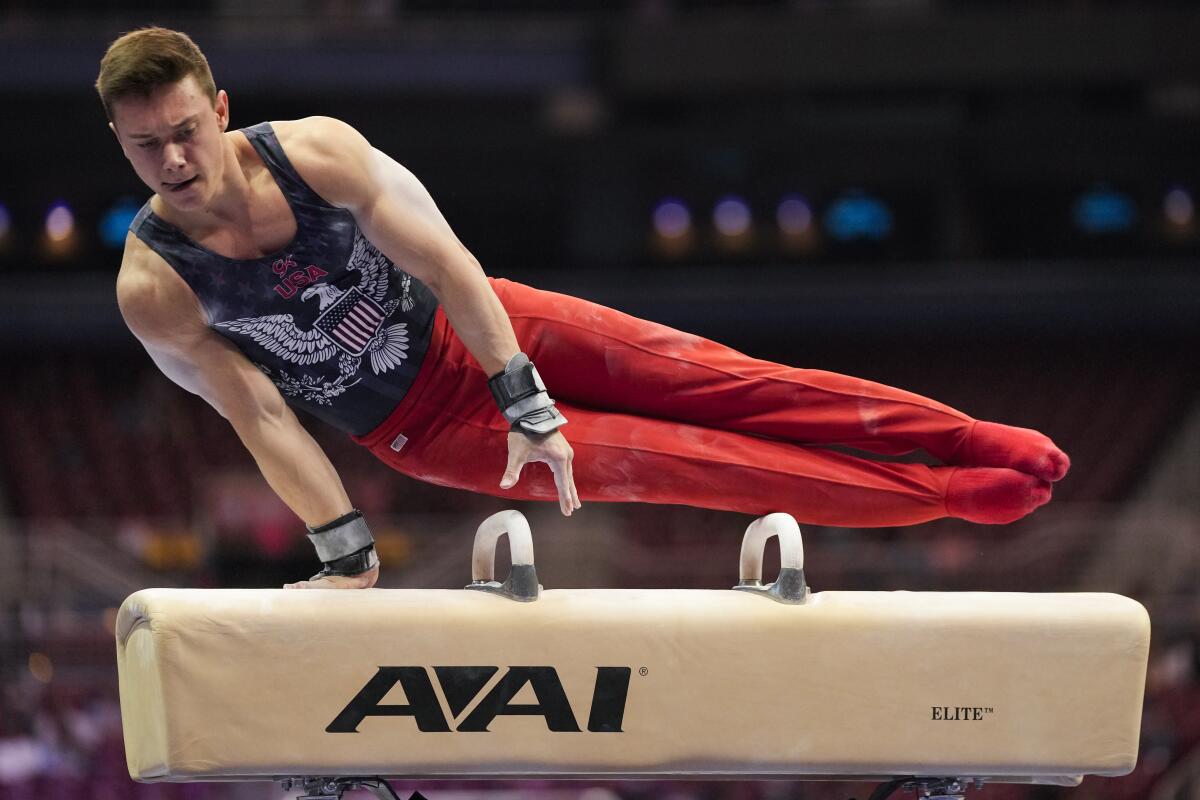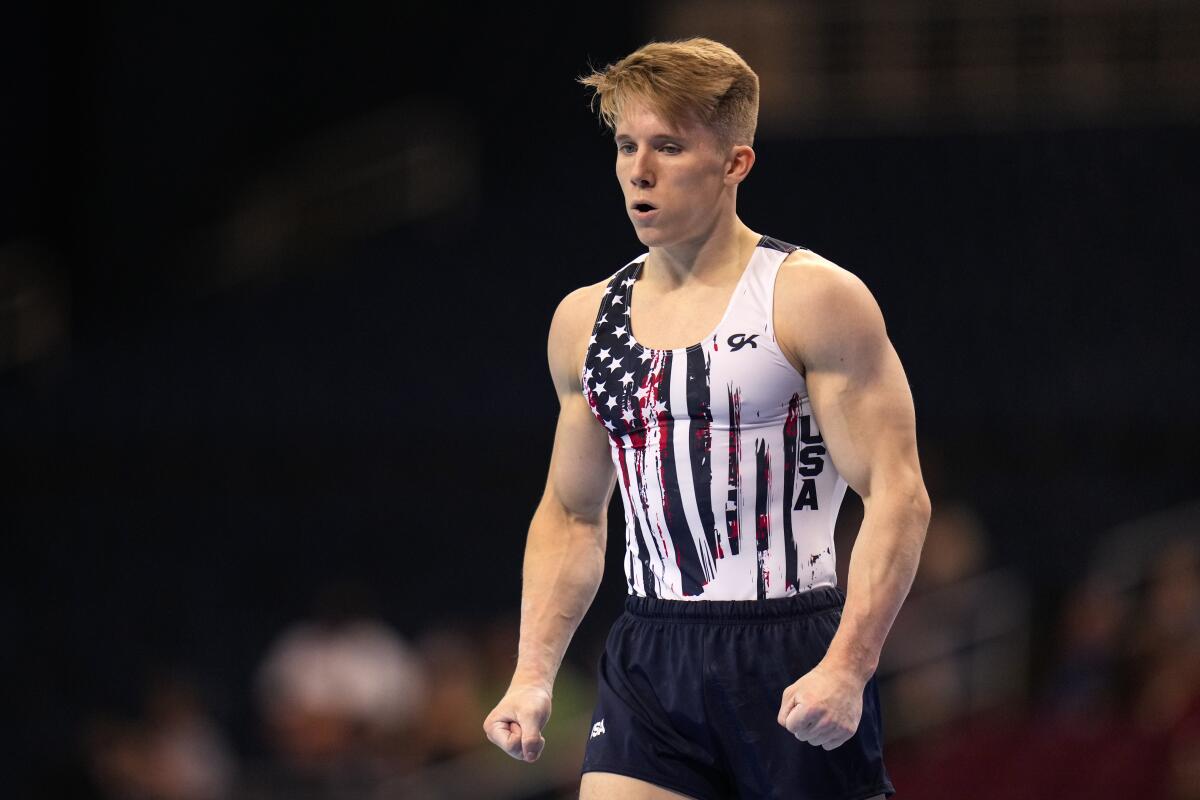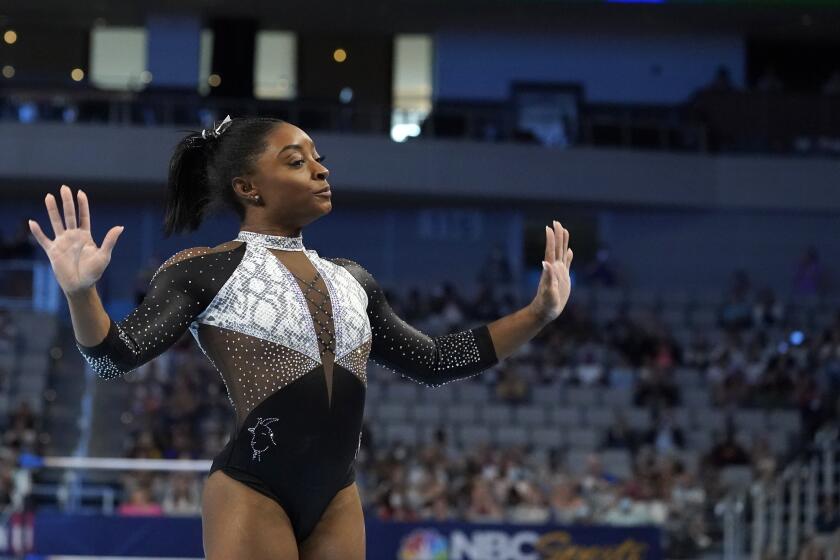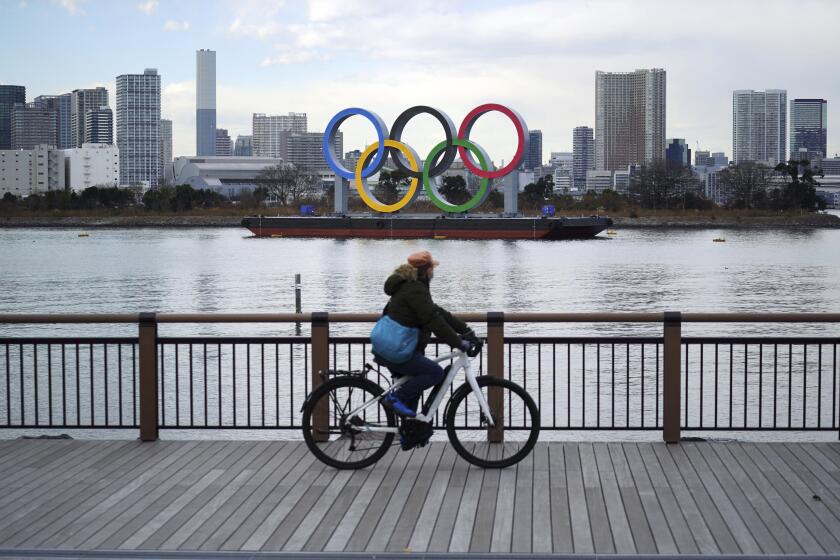Brody Malone leads U.S. Olympics men’s gym trials; SoCal’s Sam Mikulak in running

- Share via
ST. LOUIS — Brody Malone affirmed his consistent excellence, Shane Wiskus put a nightmarish performance at the U.S. championships firmly behind him, and Sam Mikulak of Newport Beach and Corona del Mar High proved the old guy still has a lot of good gymnastics left.
Malone, who earlier this month added the U.S. all-around title to the NCAA all-around crown he won while representing Stanford, earned or shared top-score honors on two of the six apparatus on Thursday to lead the field after the first day of the men’s competition at the U.S. Olympic gymnastics trials.
His score of 85.25 points put him narrowly ahead of Wiskus, who rebounded impressively from a dispiriting three-fall performance on the high bar at the U.S. championships. Wiskus, the NCAA all-around runner-up for the University of Minnesota, had 84.30 points Thursday and earned the highest parallel bars score (14.50) and third-best scores on high bar and vault.
Yul Moldauer stood third with 83.65 points and two-time Olympian Mikulak was fourth at 83.20. Mikulak, 28, tied Malone for the top score on floor exercise at 14.60. The men’s competition will end Saturday at the Dome at America’s Center.
The man with the top all-around score will earn an automatic nomination to the Tokyo Olympic team. The second-highest all-around scorer also will get an automatic nomination if he finishes in the top three in the six events in which the men compete. A selection committee will fill out the four-man team. The U.S. also can send a “plus-one” whose scores won’t count toward the team tally.
USA Gymnastics is still trying to move on from the Larry Nassar scandal and bankruptcy as Olympic trials begin. Simone Biles leads the charge.
Mikulak, a six-time U.S. champion, plans to retire after the Olympics. He said he doesn’t care if he finishes in the top two at the trials as long as he’s chosen for the Tokyo squad.
“I’m here just to do my performance. The goal is to make the team. However I do it, whatever I do, I’ll be proud of that because right now I’m just happy to be here, to be healthy,” said Mikulak, who added he had tweaked his elbow during his high bar routine and already lined up treatments for it.
“I had to fight a lot, but when I was in those moments where I had to fight a lot, I was like ‘We’re good. We’re in control still. It might not be perfect but we have the power to get through this. We have enough endurance. We have enough strength.’ And I didn’t feel like I had that on Day 1 of [the U.S. championships].”
Malone and Wiskus were not made available for post-competition interviews.

Mikulak praised the three competitors who are ahead of him. Malone is 21 years old, Wiskus is 22, and Moldauer is 24. None has competed in the Olympics.
“I think what’s really good is they’re just comfortable, they’re relaxed. They’re being themselves out there,” Mikulak said. “Being able to do that at a young age, that’s real important. Being able to settle in. Because this is a stressful time, but being able to go out and be confident, that’s a real important quality to have and these guys seem to be throwing it down like that, and I couldn’t be more proud.”
The women’s competition will begin Friday and conclude Sunday. The U.S. men have not had the same Olympic success as the U.S. women, who have won the last two team gold medals and have produced the last four all-around gold medalists. The men’s team prospects at Tokyo are iffy, likely made worse by the shutdown triggered by the COVID-19 pandemic.
For NBCUniversal, televising the Olympic Games is a marquee moment for its TV networks and a huge money-making event.
“It hurt us bad. I’m not gonna lie,” said Brett McClure, the men’s high performance director. “It was really tough. We have a lot of athletes training at universities, and universities shut down completely and sent everyone home so access and consistency in training was a major problem for us in this country and it set us back. There’s no doubt about that and kind of forced [athletes] to go out to hopefully some private clubs that may still be open. Or you’re hiking. That’s all the physical activity that you’re going to be able to do for the next not just weeks, but months. So that was really tough to handle mentally.
“Looking at China and Russia and Japan, they all bubbled immediately and were able to stay together and continue their training and we could not. So that was hard. But we were excited over the last six months or so things have turned around for us. We’ve been able to get more consistent training. Things are starting to open up and we’re feeling better but no doubt about it, definitely hurt us.”
More to Read
Go beyond the scoreboard
Get the latest on L.A.'s teams in the daily Sports Report newsletter.
You may occasionally receive promotional content from the Los Angeles Times.









